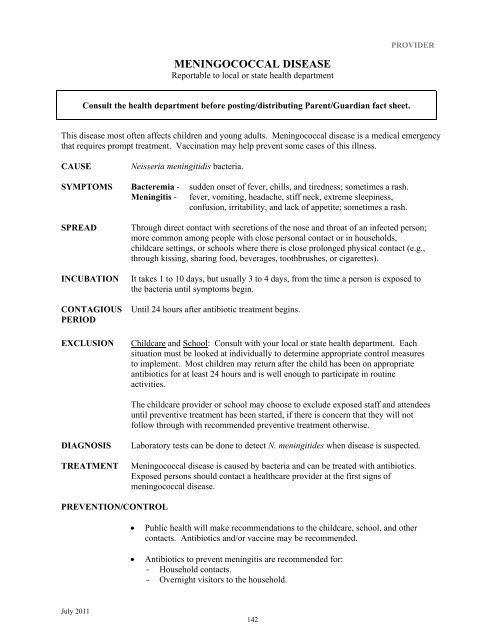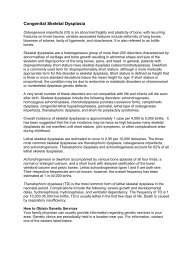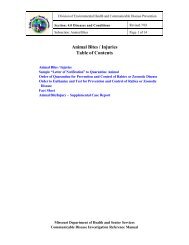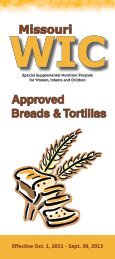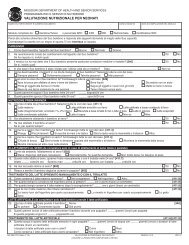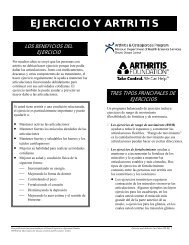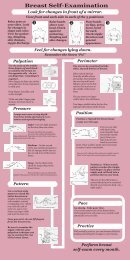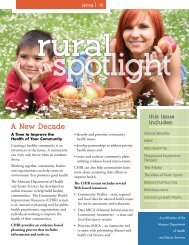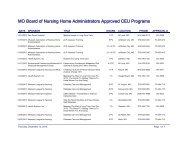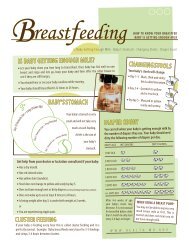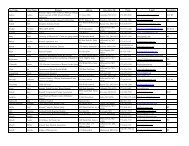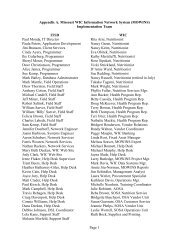Prevention and Control of Communicable Diseases - Missouri ...
Prevention and Control of Communicable Diseases - Missouri ...
Prevention and Control of Communicable Diseases - Missouri ...
Create successful ePaper yourself
Turn your PDF publications into a flip-book with our unique Google optimized e-Paper software.
July 2011<br />
MENINGOCOCCAL DISEASE<br />
Reportable to local or state health department<br />
Consult the health department before posting/distributing Parent/Guardian fact sheet.<br />
142<br />
PROVIDER<br />
This disease most <strong>of</strong>ten affects children <strong>and</strong> young adults. Meningococcal disease is a medical emergency<br />
that requires prompt treatment. Vaccination may help prevent some cases <strong>of</strong> this illness.<br />
CAUSE Neisseria meningitidis bacteria.<br />
SYMPTOMS Bacteremia - sudden onset <strong>of</strong> fever, chills, <strong>and</strong> tiredness; sometimes a rash.<br />
Meningitis - fever, vomiting, headache, stiff neck, extreme sleepiness,<br />
confusion, irritability, <strong>and</strong> lack <strong>of</strong> appetite; sometimes a rash.<br />
SPREAD Through direct contact with secretions <strong>of</strong> the nose <strong>and</strong> throat <strong>of</strong> an infected person;<br />
more common among people with close personal contact or in households,<br />
childcare settings, or schools where there is close prolonged physical contact (e.g.,<br />
through kissing, sharing food, beverages, toothbrushes, or cigarettes).<br />
INCUBATION It takes 1 to 10 days, but usually 3 to 4 days, from the time a person is exposed to<br />
the bacteria until symptoms begin.<br />
CONTAGIOUS<br />
PERIOD<br />
Until 24 hours after antibiotic treatment begins.<br />
EXCLUSION Childcare <strong>and</strong> School: Consult with your local or state health department. Each<br />
situation must be looked at individually to determine appropriate control measures<br />
to implement. Most children may return after the child has been on appropriate<br />
antibiotics for at least 24 hours <strong>and</strong> is well enough to participate in routine<br />
activities.<br />
The childcare provider or school may choose to exclude exposed staff <strong>and</strong> attendees<br />
until preventive treatment has been started, if there is concern that they will not<br />
follow through with recommended preventive treatment otherwise.<br />
DIAGNOSIS Laboratory tests can be done to detect N. meningitides when disease is suspected.<br />
TREATMENT Meningococcal disease is caused by bacteria <strong>and</strong> can be treated with antibiotics.<br />
Exposed persons should contact a healthcare provider at the first signs <strong>of</strong><br />
meningococcal disease.<br />
PREVENTION/CONTROL<br />
� Public health will make recommendations to the childcare, school, <strong>and</strong> other<br />
contacts. Antibiotics <strong>and</strong>/or vaccine may be recommended.<br />
� Antibiotics to prevent meningitis are recommended for:<br />
- Household contacts.<br />
- Overnight visitors to the household.


